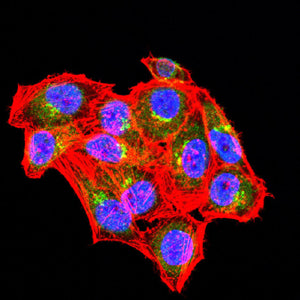
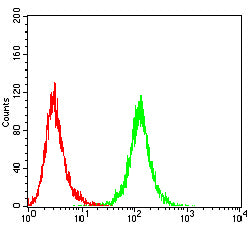
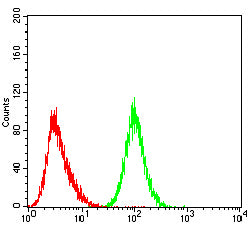
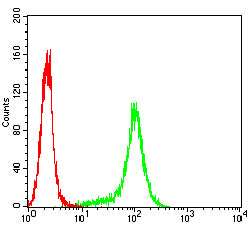
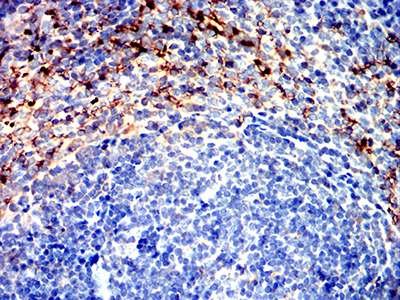
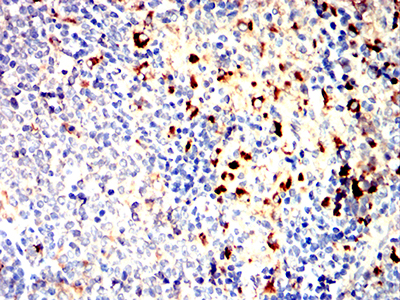
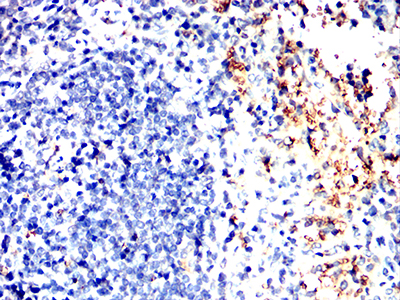
| WB | 咨询技术 | Human,Mouse,Rat |
| IF | 1/200 - 1/1000 | Human,Mouse,Rat |
| IHC | 1/100 - 1/500 | Human,Mouse,Rat |
| ICC | 1/200 - 1/1000 | Human,Mouse,Rat |
| FCM | 1/200 - 1/400 | Human,Mouse,Rat |
| Elisa | 咨询技术 | Human,Mouse,Rat |
| Aliases | TGD; ABC1; CERP; ABC-1; HDLDT1; HPALP1; HDLCQTL13 |
| Entrez GeneID | 19 |
| clone | 6B7A11 |
| WB Predicted band size | 254 kDa |
| Host/Isotype | Mouse IgG2a |
| Antibody Type | Primary antibody |
| Storage | Store at 4°C short term. Aliquot and store at -20°C long term. Avoid freeze/thaw cycles. |
| Species Reactivity | Human,Mouse,Rat,Rabbit,Monkey |
| Immunogen | Purified recombinant fragment of human ABCA1 (AA: 2081-2261) expressed in E. Coli. |
| Formulation | Purified antibody in PBS with 0.05% sodium azide |
+ +
以下是关于ABCA1抗体的3篇参考文献的简要信息:
---
1. **文献名称**: *ATP-binding cassette transporter A1 (ABCA1) antibodies characterization and application in studies of macrophage cholesterol efflux*
**作者**: Smith JD et al.
**摘要**: 该研究开发了针对ABCA1蛋白的高特异性单克隆抗体,验证了其在Western blot和免疫荧光中的应用,证实ABCA1在巨噬细胞胆固醇外流中的关键作用,为动脉粥样硬化机制研究提供了工具。
---
2. **文献名称**: *Comparative analysis of commercially available anti-ABCA1 antibodies for immunoassays*
**作者**: Tanaka N et al.
**摘要**: 对比了多种市售ABCA1抗体的灵敏度和特异性,发现某些抗体在检测低表达细胞模型时存在交叉反应,提出标准化抗体选择流程以提高实验可重复性,尤其适用于阿尔茨海默病相关研究。
---
3. **文献名称**: *ABCA1 antibody-based detection of protein trafficking defects in Tangier disease*
**作者**: Remaley AT et al.
**摘要**: 利用ABCA1抗体分析Tangier病患者细胞模型,揭示ABCA1蛋白运输障碍导致脂质积累的分子机制,为遗传性代谢疾病的诊断及治疗靶点开发提供依据。
---
这些文献涵盖了抗体开发、性能比较及疾病机制研究,可帮助研究者选择合适抗体并理解其应用场景。如需扩展,可补充针对特定技术(如冷冻电镜)的抗体研究。
The ATP-binding cassette transporter A1 (ABCA1) is a critical membrane protein involved in cellular cholesterol efflux, a key step in reverse cholesterol transport. It facilitates the transfer of phospholipids and cholesterol to apolipoprotein A-I (apoA-I), forming nascent high-density lipoprotein (HDL) particles. Dysregulation of ABCA1 is linked to atherosclerosis, Tangier disease (characterized by extremely low HDL levels), and other metabolic disorders. Antibodies targeting ABCA1 are essential tools for studying its expression, localization, and function in various tissues, including liver, macrophages, and endothelial cells.
ABCA1 antibodies are widely used in techniques like Western blotting, immunohistochemistry, flow cytometry, and immunofluorescence to quantify protein levels, assess tissue distribution, or monitor changes during disease progression. Both monoclonal and polyclonal antibodies are available, with epitopes typically targeting cytoplasmic domains (e.g., N-terminal or C-terminal regions) due to challenges in producing antibodies against large extracellular loops. Researchers often validate antibody specificity using ABCA1-knockout models or siRNA-mediated knockdown. Commercial antibodies may vary in performance across applications, necessitating optimization of protocols. Recent studies also employ ABCA1 antibodies to investigate its post-translational modifications (e.g., phosphorylation) or interactions with regulatory proteins like LXR receptors, providing insights into therapeutic strategies for cardiovascular diseases.
×